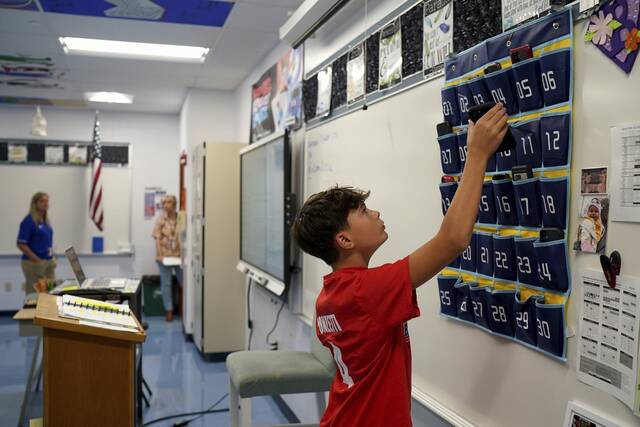When backpack-clad students returned to Allegheny Valley School District classrooms, many had cellphones in hand.
That did not last for long.
The district that once allowed teachers to determine how to handle cellphones in class cracked down at a board meeting earlier this month, requiring students to put their devices away during instruction time.
The district situated nearly 20 miles north of Pittsburgh is not alone in its policy change.
As schools across the country limit student access to cellphones, Western Pennsylvania schools are split on policies for the devices.
Officials push restrictions
More than 80% of K-12 teachers say their school has a cellphone policy, according to Pew Research Center data reported in June.
The Pennsylvania Senate approved a bill in July to encourage schools to restrict access to cellphones during the school day. It would distribute grants to school districts to buy locking bags for students’ cellphones, providing that districts create a policy requiring the phones to be stored during the school day.
The Penn Hills School Board approved purchasing the bags in April 2022.
Monessen City School District started using the bags at the end of last school year at a cost of $13,000, Superintendent Robert Motte said.
The district will follow a similar cellphone policy this academic year. Students are required to turn their cellphones over at the start of each school day, and the devices are returned before dismissal. Accommodations are in place for students leaving early or attending Forbes Road Career & Technology Center.
The state bill, proposed by Sen. Ryan Aument, R-Lancaster County, cites a desire to improve mental health and academic performance. It passed 45-5 and moved on to the House for consideration just two weeks after U.S. Surgeon General Vivek Murthy asked Congress to require warning labels on social media platforms.
This falls in line with states such as California, whose officials have encouraged schools to limit cellphone access. Gov. Gavin Newsom sent letters to school districts Aug. 13, promoting the restriction of cellphones on school grounds, according to the Associated Press.
Utah Gov. Spencer Cox sent letters to schools and the state board of education in January sharing his concerns about the negative impact of social media on students. He urged education leaders to remove cellphones from classrooms.
Florida was the first state to take action on cellphones with a law that went into effect in July 2023, the Associated Press reported in February. It requires all state public schools to ban student cellphone use during class and block access to social media on district Wi-Fi.
Oklahoma, Vermont and Kansas have introduced similar legislation, according to the Associated Press.
Sens. Tom Cotton, R-Arkansas, and Tim Kaine, D-Virginia, introduced a bill in November that would require the U.S. Department of Education to complete a study on the effects of cellphone use on K-12 students’ mental health and academic performance.
But as a high school outside Atlanta grieves in the aftermath of a shooting that killed four people and wounded nine Wednesday, South Carolina state Rep. Wendell Gilliard takes an opposing stance to cellphone bans.
The state’s Department of Education approved Tuesday a model cellphone policy, dubbed “Free to Focus SC,” which prohibits use of personal electronic devices during the school day.
School districts will roll out the policy this fall, and statewide implementation will begin in January, according to a press release.
Gilliard, D-Charleston, told TribLive Thursday he understands schools limiting cellphone use to improve attention during class, but the safety of students during emergency situations should also be considered.
“My point is that if you ought to pull cellphones,” he said, “then have in place another rule that would guarantee the parents would have, with expediency, the ability to find out about the wellness of their children during these times of terror.”
Testing the waters
Allegheny Valley revisited its stance on students’ cellphones as part of a regular districtwide policy review, said Superintendent Patrick Graczyk, who held a roundtable discussion with parents on the topic last school year.
“I would say our parents weren’t adamantly opposed to cellphones, and many of them weren’t adamantly supporting cellphones,” Graczyk said. “They were a little bit in between on their feelings.
“Some families felt that cellphone use was getting extreme, not only in school, but they see it with their own kids in a variety of settings,” he said. “Some felt that it had a very useful academic purpose.”
The school board permitted district leaders to begin enforcing the new policy — prohibiting phones during class — on the first day of instruction.
An official policy change has not yet been voted on, Graczyk said.
“It was decided that we would move ahead with this procedure and then we would go back and revise policy,” he said. “There wouldn’t be enough time right now to rewrite the policy, and we want to see how this change of policy goes.”
A new policy draft will be up for vote in September or October, Graczyk said. If the board votes against the revised policy, the district will revert back to its previous guidelines.
The district first launched a cellphone policy a few years ago, Graczyk said. Teachers could decide whether to bar phones during instruction time.
“A teacher may look at a cellphone being off as eliminating distractions,” he said. “Another teacher may look at the ability to listen to music while you’re working as something that helps the students.
“The district is taking the stance that we want to limit those types of distractions although we do not believe there was an abundance of them.”
Woodland Hills bans phones during school day
Students at Woodland Hills High School do not have any access to their phones during school.
Once students pass through security, they place their phones in a container associated with their last class of the day, according to the school district’s website. The containers are stored in a secure, locked area until the end of the day, when they are delivered to classrooms for students to retrieve their devices.
Students who need to leave school early turn in their phone to main office staff until their dismissal.
Greensburg Salem students adapted
Greensburg Salem High School held a flexible policy until last school year, Superintendent Ken Bissell said. Students were free to use their phones under the parameters set by each of their teachers.
“The problem with that is it becomes inconsistent very quickly,” Bissell said. “If they go into their first classroom and their expectation is they are not to use their phones and they go into … their second class and they are allowed to use them … it kind of pits classroom against classroom.”
For the 2023-24 academic year, high school students were asked to put away their phones during class. Bissell said several teachers purchased a cellphone holder — a hanging device with pockets to store phones.
Although some students were displeased with the policy, most adapted quickly.
“By the end of September and October, students were even having conversations with teachers thanking them,” Bissell said.
Students are permitted to use their phones in between classes and during emergency situations, he said.
“That’s problematic, too,” Bissell said, “because sometimes too much communication during an emergency situation can cloud the reality of what’s going on.”
Emergency interpretation varies
Bissell isn’t alone in this observation.
According to the Westmoreland Intermediate Unit’s school safety and security coordinator, phones complicate schools’ ability to put out accurate information during an emergency, such as a fire or school shooting.
Joe Rice started working at the intermediate unit in 2021 after 15 years as principal at Catholic schools Mother of Sorrows in Murrysville and Aquinas Academy in Greensburg.
At the time, social media did not have as big a grip on students, Rice said. The MySpace platform launched just three years before Rice became a school administrator.
For schools, conveying and discerning the truth during emergencies has been complicated by the popularity of platforms like Instagram and X, formerly known as Twitter.
“If you’ve got 500 kids all posting on X their own perspective, their own narrative, you’re going to have 500 narratives out there,” Rice said. “So controlling that narrative becomes very, very hard — almost impossible.”
But phones and social media also can be used as a tool in these situations, he said.
Students can use their cellphones once they are safe to let parents know where to pick them up.
“If we have a bad event at a school, every parent whose child goes to that school is going to rush to the school,” Rice said. “Your parking lot is set up to accommodate a certain number of cars parked, and then like pick up and drop off, it’s usually a flow.”
“A kid can contact their parent and say, ‘Hey mom, they’re going to dismiss us, and they’re going to do it at the church down the road.’ Even if it just saves a few cars from flooding into that parking lot, it’s going to make life easier.”
School public information officers can use social media to share accurate information with parents.
“Parents want that same thing,” Rice said. “They want that direct, instant communication with their kids. They want to know their kids are safe.”
Greensburg Salem High School plans to continue restricting phone access during class this year, Bissell said. Principals are discussing whether it is necessary to extend the restrictions to the middle school level.
Issue ‘here to stay’
High school students in the Jeannette City School District also have to have their phones put away during class, stored in their locker or backpack, Superintendent Matthew Jones said.
Teachers for seventh and eighth grade students, however, began collecting students’ phones during instruction time last school year.
“(It was) the teachers collaborating and deciding that was probably going to be the best (plan) for that group,” Jones said.
The district will continue to monitor the policy for inefficiencies this year, he said.
“It’s something that we know is here to stay, and we’ve got to continue to manage and monitor the best we can,” he said. “And part of that is just making sure that we’re doing what’s best for students and best for educational atmospheres in schools.”
‘This is their native land’
The way Rice sees it, cellphone bans may not be the best solution.
“The moment (students) leave my building, they’re getting their phone out and they’re putting it in their hand and they’re doing stuff with it,” he said.
Schools should help students use their cellphones to their advantage, Rice said.
“I am an immigrant in this world of technology. It didn’t exist when I was born,” Rice said. “Young people today, this is their native land. I shouldn’t be determining how they function in their native land. What I should be doing is helping them function better.”
“Maybe instead of teaching them that that thing is bad,” he said, “maybe teach them how it can be good: ‘Here’s how your phone can be used. Here are the great things it can do.’ ”








